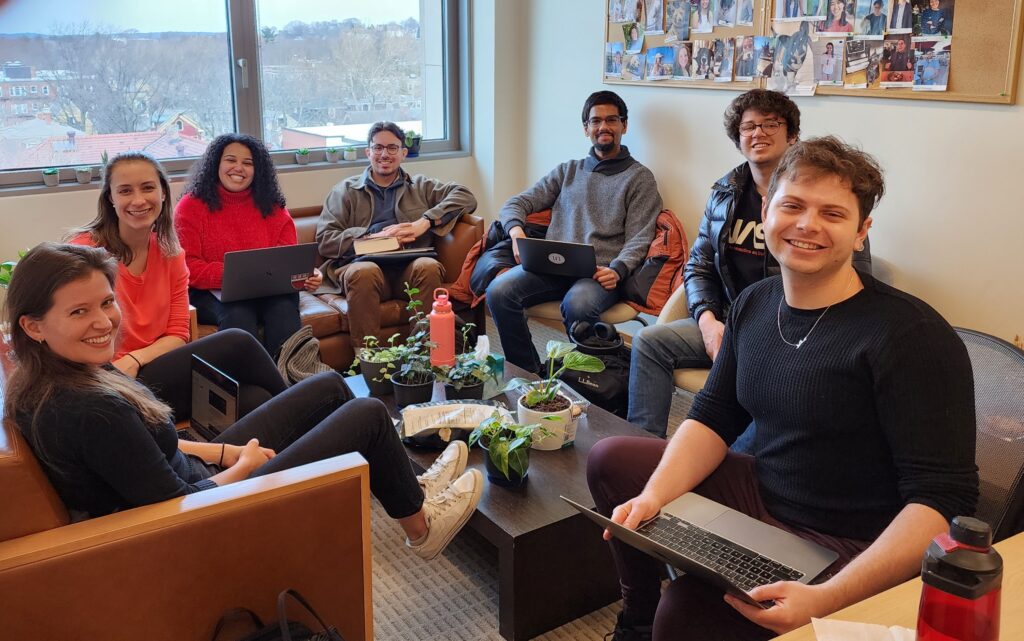Over the course of his 1L year in the Tenant Advocacy Project (TAP), Matthew Rock ‘24 saw firsthand the power of the reasonable accommodation letter as a tool for housing security. This year, he led an initiative to bring that tool to as many Boston area tenants as possible.
TAP’s “pop-up” reasonable accommodation clinics successfully launched this fall. Each semester, TAP students spend a day meeting with clients facing housing issues, assessing their needs and helping them write reasonable accommodation letters. A reasonable accommodation request appeals to the connection between a person’s disability and the housing-related issue they are experiencing, such as eviction due to disability-related issues. The letter addresses the issue and requests the landlord to change their policies, procedures, or practices to accommodate their tenant’s disability.
As a 1L, Matthew drafted one such letter for a client he worked closely with throughout the year. After many meetings with his client, who was facing eviction due to alleged involvement with the criminal legal system along with serious mental health disabilities, Matthew wrote a reasonable accommodation request that resulted in the dismissal of the entire eviction case.
“It doesn’t always happen where a reasonable accommodation can resolve the case. It depends, of course, on the circumstances,” says Rock. “But that was really my first exposure to the real power of this tool of the reasonable accommodation request, using disability law to help individuals stand up for their rights and maintain the safety and stability of their housing situation. And it was really that experience that provided the seed for what I would do for much of this year in TAP, which is leading the new initiative of the reasonable accommodation clinics in conjunction with an amazing team that created this new service that TAP is offering.”
As the leader of TAP’s Policy and Community Outreach team, Rock and his peers aim to maintain tight connections between TAP and their community partners, organization such as City Life/Vida Urbana and Greater Boston Legal Services, while leveraging those connections to expand TAP’s reach and impact. Through conversations with their partners and clients, TAP found that the need for reasonable accommodation letters was widespread, so they decided to scale up their ability to deliver these letters by starting the bi-annual clinics.

The clinics consist of clients referred to TAP by their community partners meeting with pairs of TAP students on a given day each semester, either virtually or in person. The students work with the client for an hour to get the reasonable accommodation request written. During the meetings, students counsel the clients and work with them to draft the letter, explaining the different tools that clients can use to advocate for themselves in the future. So far, the initiative has been met with positive feedback.
“Clients were just grateful for someone to take the time to help write down what their legal arguments are on paper,” says Rock. “That helps empower them to better advocate for themselves. In most circumstances, this letter isn’t going to solve all their problems. But I think that the clients express and recognize that it can be a really helpful tool in their toolkit. And they enjoyed the process and were appreciative of getting equipped with that tool through this clinic.”
The teamwork of TAP students working together on the clinics creates an “incredible” learning experience, says Rock, who also rallied students from the Harvard Legal Aid Bureau and the Housing Law Clinic to join in. “You have a team of people who are there to offer their opinions and share their experiences. That collective wisdom, not only from the clinical instructor but also from your fellow students, makes you such a stronger advocate working with the client in their own particular situation. You can honor what they’re going through by doing your homework of getting advice from others who have worked with folks in similar situations.”

Over the course of two clinics, roughly thirty students worked with 25 clients, expanding TAP’s footprint and impact. “TAP’s pop-up clinics are emblematic of the way TAP operates,” says TAP clinical instructor and supervising attorney Gary Allen. “Our mission to stabilize housing in our community produces significant and tangible benefits for marginalized renters, and simultaneously nurtures and trains an incredible and accomplished group of law students from multiple HLS programs. The model that TAP has developed has the potential to be replicated at law schools nationwide.”
Rock notes that amongst the greater Boston area’s myriad housing issues, including gentrification and a shortage of affordable housing, finding any way to alleviate the precariousness of housing stability for the most marginalized in society is critical—a lesson he has also learned while being a student in the Harvard Legal Aid Bureau.
“It’s important to listen to clients and be as open to what they’re going through as possible,” Rock reflects on his work in the housing law space. “We have the very difficult responsibility of making sure that this person understands that they’re in a really unfair and unjust system, and that they need to grapple with what legal options are available to them. Then we equip them with the understanding and the tools that they need to make sometimes really difficult decisions.”
Beyond the reasonable accommodation letter itself, the clinics provide invaluable tools to help people maintain the stability of their housing situations—education and empowerment. Looking ahead, TAP is excited to continue and expand the initiative in the future.
Filed in: Clinical Spotlight